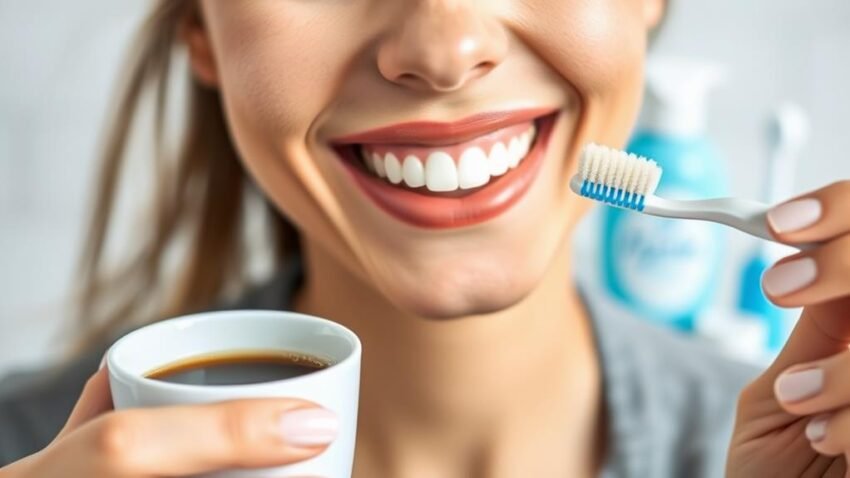Just like a favorite book with yellowed pages, our teeth can bear the telltale signs of our daily habits—especially if you're a coffee lover like me. Coffee stains on teeth are more than just a cosmetic issue; they can indicate underlying oral health concerns. To keep your smile as bright as your morning brew, it's essential to adopt a few simple strategies. From limiting daily cups to incorporating specific dietary changes, there are several ways to prevent those unwanted stains. Let's explore these methods and see how you can enjoy your coffee without compromising your dental health.
Limit Daily Coffee Intake

If you're serious about preventing coffee stains on your teeth, reducing your daily coffee intake is an essential step. Drinking more than 2 cups of coffee a day can lead to the accumulation of stubborn stains on your teeth. The primary culprit behind these stains is tannins, substances found in coffee that seep into the enamel of your teeth and cause discoloration. Arabica coffee, known for its wide range of flavors, can be particularly rich in these tannins, making it important to be mindful of consumption.
Limiting your coffee consumption to 1-2 cups a day helps prevent these tannins from embedding themselves in your teeth. This proactive approach to oral hygiene not only reduces the likelihood of stains but also decreases the need for frequent whitening procedures. By cutting down on coffee, you're taking a significant step towards maintaining a brighter, stain-free smile.
It's worth noting that while it might seem restrictive to limit your coffee intake, it's a small sacrifice compared to dealing with persistent stains. If you still enjoy drinking coffee, simply being mindful of your consumption can make a significant difference in your oral hygiene. Over time, this habit will help you prevent coffee stains and keep your teeth looking their best without constant whitening treatments.
Eat Before Drinking Coffee
Reducing your coffee intake is just one part of the equation; another effective strategy involves eating before you drink coffee. When you eat before drinking coffee, you create a protective barrier against staining. This barrier helps minimize the direct contact of tannins with your teeth, which is essential for preventing discoloration. Additionally, many instant coffee varieties contain lower acidity levels, which can also help in reducing the potential for stains compared to fresh brewed coffee instant coffee production methods.
Eating before coffee also stimulates saliva production. Saliva is a natural cleaner that helps wash away staining compounds from coffee. This process can notably reduce the risk of tooth stains.
Chewing on raw fruits and vegetables before coffee can be particularly beneficial. These foods naturally clean teeth and help reduce staining. The fiber in these foods acts as a gentle scrub, removing residue and debris that could otherwise contribute to stains.
Increase Fruit and Vegetable Intake
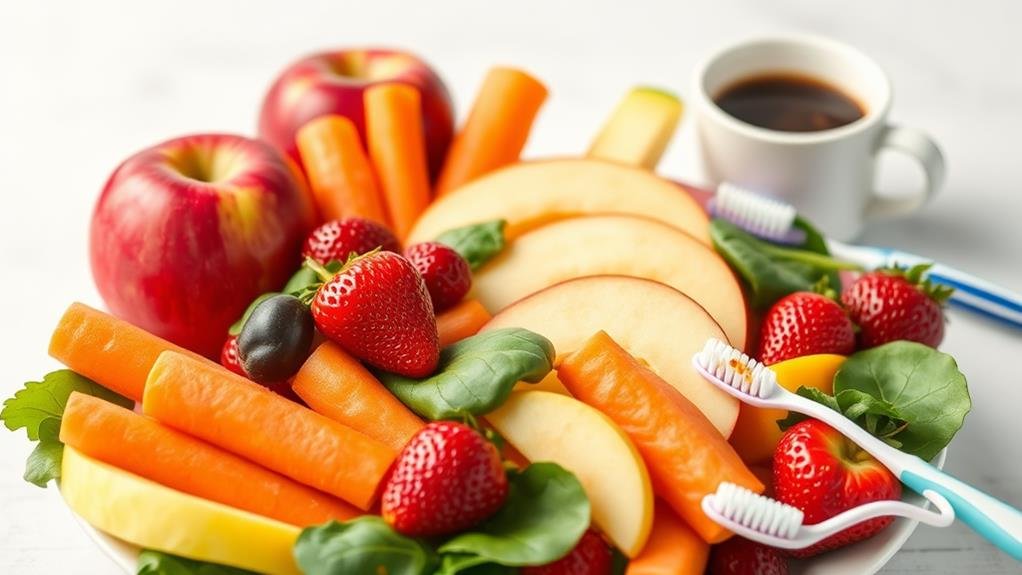
Increasing your intake of fruits and vegetables is an important strategy for protecting your teeth from coffee stains. These foods not only provide essential nutrients but also play a significant role in maintaining good oral health.
Here are four ways that fruits and vegetables can help prevent stains on your teeth:
- Boost Saliva Production: Chewing on raw fruits and vegetables can stimulate saliva production, which naturally cleanses and protects your teeth.
- Break Down Bacteria: The natural fibers in these foods help break down bacteria and plaque buildup in the mouth, reducing the risk of coffee stains on teeth.
- Maintain Oral Hygiene: Increasing your intake of fruits and vegetables aids in maintaining good oral hygiene, which is vital for preventing stains.
- Support Healthy Gums: A diet rich in fruits and vegetables supports healthy gums and teeth, potentially reducing the impact of coffee stains.
Use a Straw for Coffee
In addition to a balanced diet rich in fruits and vegetables, there's another simple yet effective way to protect your teeth from coffee stains: using a straw. This method can notably reduce the direct contact between coffee and your teeth, which is a primary cause of visible staining. When you drink coffee through a straw, it helps guide the liquid towards the back of your mouth, avoiding prolonged exposure to the front teeth where stains are most noticeable.
Using a straw is particularly beneficial with iced coffee because it prevents tannins from sticking to the enamel. Tannins are compounds found in coffee that can leave stubborn stains on your teeth. By minimizing contact between these tannins and your enamel, you can maintain a brighter smile.
Incorporating a straw into your coffee-drinking routine is easy and effective. It's a simple tool that limits the contact of coffee with your teeth surfaces, thereby reducing the influence of staining agents. This small change can make a big difference in preserving the whiteness and health of your teeth over time. So next time you enjoy your coffee, consider using a straw to protect your smile.
Drink Coffee in One Sitting
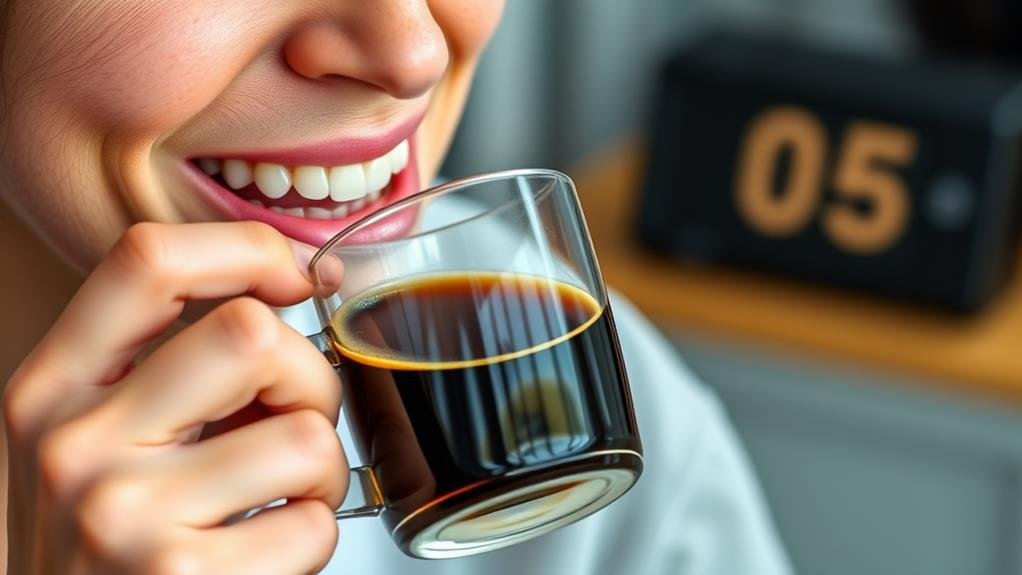
When it comes to preventing coffee stains, the timing of your coffee consumption can be just as pivotal as the method. Drinking your coffee in one sitting is a simple yet effective way to minimize staining.
Here are four key reasons why finishing your coffee in one sitting is beneficial:
- Reduce exposure time: By drinking your coffee quickly, you limit the amount of time tannins have to interact with your teeth, thereby reducing the potential for staining.
- Avoid prolonged exposure: Sipping coffee throughout the day increases the chances of tannins seeping into enamel and causing stains. Finishing your coffee in one sitting avoids this prolonged exposure.
- Prevent accumulation of staining compounds: Drinking coffee in a single sitting helps prevent the accumulation of staining compounds on tooth surfaces.
- Minimizing staining: Consuming coffee quickly prevents prolonged contact with teeth, which minimizes staining.
Brush Teeth Immediately After
Brushing your teeth immediately after drinking coffee is an important step in preventing stains, but it's important to do it correctly. While the idea might seem straightforward, there are some key considerations to keep in mind. Coffee contains tannins, which can stain your teeth over time. However, rushing to brush your teeth right after drinking coffee isn't the best approach.
It's recommended to wait at least 30 minutes after consuming acidic beverages like coffee before brushing your teeth. This waiting period helps prevent enamel damage that can occur if you brush too soon. After the 30 minutes have passed, brushing your teeth with a fluoride toothpaste can help strengthen your enamel and prevent future staining.
Using a soft-bristled toothbrush gently yet effectively removes coffee residue from your teeth. Consistent post-coffee brushing can help protect against long-term staining and maintain a brighter smile. So, when you're thinking about brushing your teeth right after coffee, remember to wait a bit and then brush gently to help prevent coffee stains from forming. This small delay can make a big difference in keeping your teeth healthy and stain-free.
Use an Electric Toothbrush
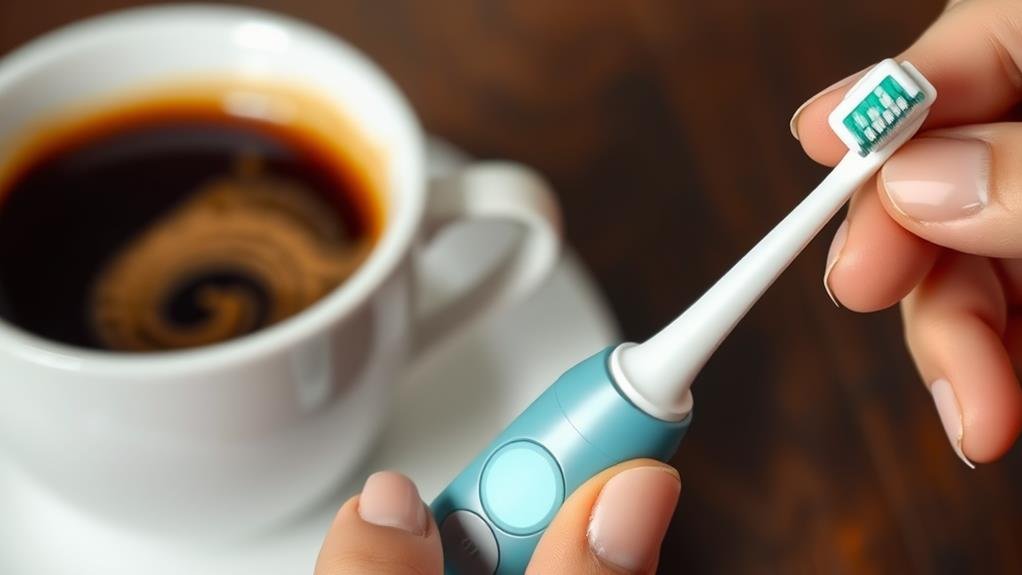
Preventing coffee stains on your teeth just got easier with the right tool. An electric toothbrush is a game-changer in maintaining a stain-free smile while enjoying your daily cup of coffee.
Here are four key reasons why an electric toothbrush stands out:
- Efficient Cleaning: Electric toothbrushes are more effective at removing coffee stains compared to manual toothbrushes.
- Better Reach: The oscillating or rotating bristles can better reach and clean teeth surfaces.
- Plaque Buildup Prevention: Electric toothbrushes help deter coffee stains by removing plaque buildup more efficiently.
- Improved Oral Health: Studies show that electric toothbrushes can lessen coffee stains and enhance overall oral health.
Using an electric toothbrush guarantees that your teeth receive thorough and consistent cleaning. The advanced bristle action helps in eliminating coffee residue and other substances that can lead to stains. By incorporating an electric toothbrush into your daily routine, you can effectively maintain your oral health and prevent coffee stains from forming. This investment not only aids in keeping your smile stain-free but also contributes to better overall dental hygiene. So, if you're serious about enjoying your coffee without worrying about the stains, consider switching to an electric toothbrush today.
Regular Dental Visits
Regular dental visits are necessary for managing coffee stains and maintaining overall oral health. These visits, typically recommended every six months, play an important role in preventing and addressing the discoloration caused by coffee consumption. During these regular visits, professional cleanings help remove surface stains that can build up over time. This is particularly significant for coffee drinkers, as frequent cleanings can prevent the stains from becoming deeply embedded.
Dentists can also provide personalized advice on how to prevent coffee stains on your teeth. They may recommend specific oral care products or practices tailored to your dental needs. If the stains are more severe, dental professionals can offer professional whitening treatments to effectively remove deep coffee stains.
Consistent dental check-ups are essential for monitoring and addressing any oral health issues related to coffee stains. By staying on top of your dental care through regular visits, you guarantee that any potential problems are caught early and managed effectively. This proactive approach not only keeps your teeth looking their best but also contributes to overall oral health and well-being.
Effective Stain Removal Techniques
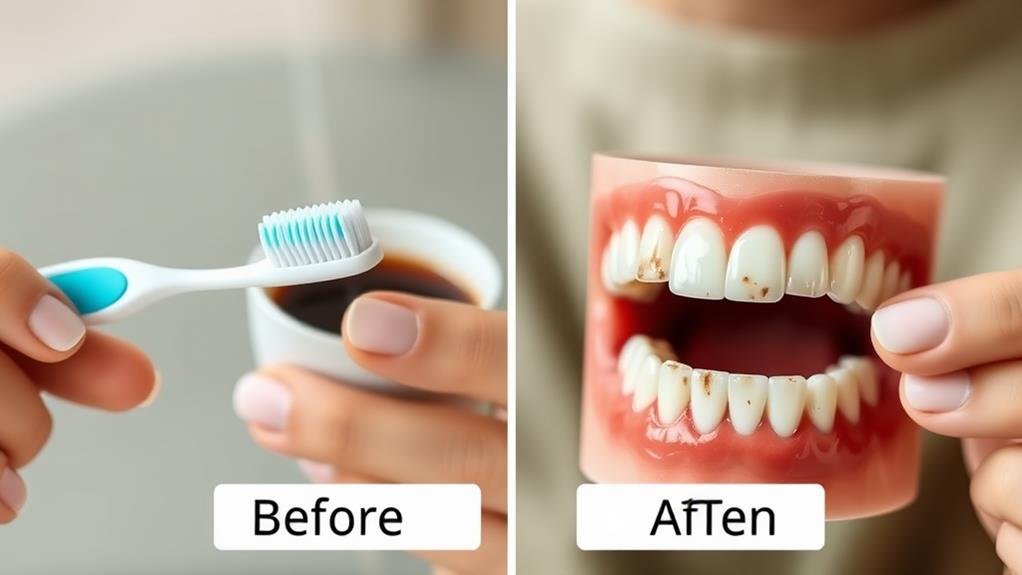
How can you effectively eliminate coffee stains from your teeth? Removing coffee stains requires a combination of the right techniques and products. Here are some effective methods to contemplate:
- Brush Your Teeth Right: Mix baking soda and hydrogen peroxide to create a paste, and brush your teeth with it twice daily. This combination is particularly effective at eliminating tough coffee stains.
- Use an Electric Toothbrush: An electric toothbrush can offer more thorough cleaning than a manual one, helping to eradicate stains more efficiently.
- Try Coconut Oil Pulling: This method involves swishing coconut oil in your mouth to help prevent plaque buildup and neutralize acids that contribute to staining.
- Whitening Toothpaste and Strips: Use whitening toothpaste and strips cautiously to avoid damaging your enamel while addressing coffee stains.
Consistency is key. Maintain a regular dental hygiene routine by brushing your teeth for at least two minutes, twice a day, to prevent tannin accumulation from coffee consumption. By combining these methods, you can keep your teeth clean and reduce the appearance of coffee stains effectively. Remember, it's about both eliminating existing stains and preventing new ones from forming.
Conclusion
To keep your teeth stain-free, it's all about balance. Limit your coffee intake to 1-2 cups a day, and remember to eat before you drink to create a protective barrier. Using a straw and finishing your coffee quickly also helps. Regular dental visits and brushing with the right tools can make a big difference. After all, an ounce of prevention is worth a pound of cure when it comes to coffee stains on your teeth.

